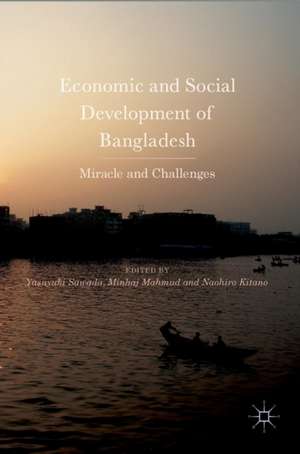Economic and Social Development of Bangladesh: Miracle and Challenges
Editat de Yasuyuki Sawada, Minhaj Mahmud, Naohiro Kitanoen Limba Engleză Hardback – 17 ian 2018
This book discusses Bangladesh’s economic and social development that may be called a “miracle” since the country has achieved remarkable development progress under several unfavorable situations: weak governance and political instabilities, inequality, risks entailed in rapid urbanization, and exposure to severe disaster risks. The authors examine what led to this successful economic development, and the potential challenges that it presents, aiming to elicit effective policy interventions that can be adapted by other developing countries.
Toate formatele și edițiile
| Toate formatele și edițiile | Preț | Express |
|---|---|---|
| Paperback (1) | 1108.04 lei 43-57 zile | |
| Springer International Publishing – 4 iun 2019 | 1108.04 lei 43-57 zile | |
| Hardback (1) | 1118.30 lei 43-57 zile | |
| Springer International Publishing – 17 ian 2018 | 1118.30 lei 43-57 zile |
Preț: 1118.30 lei
Preț vechi: 1363.78 lei
-18% Nou
Puncte Express: 1677
Preț estimativ în valută:
213.98€ • 224.02$ • 177.06£
213.98€ • 224.02$ • 177.06£
Carte tipărită la comandă
Livrare economică 07-21 aprilie
Preluare comenzi: 021 569.72.76
Specificații
ISBN-13: 9783319638379
ISBN-10: 3319638378
Pagini: 314
Ilustrații: XXXIX, 311 p. 9 illus., 8 illus. in color.
Dimensiuni: 148 x 210 x 21 mm
Greutate: 0.72 kg
Ediția:1st ed. 2018
Editura: Springer International Publishing
Colecția Palgrave Macmillan
Locul publicării:Cham, Switzerland
ISBN-10: 3319638378
Pagini: 314
Ilustrații: XXXIX, 311 p. 9 illus., 8 illus. in color.
Dimensiuni: 148 x 210 x 21 mm
Greutate: 0.72 kg
Ediția:1st ed. 2018
Editura: Springer International Publishing
Colecția Palgrave Macmillan
Locul publicării:Cham, Switzerland
Cuprins
1. Development Transformation in Bangladesh: An Overview.- 2. The Miraculous Development of the Garment and Pharmaceutical Industries in Bangladesh.- 3. Welfare Implications of Subsidies in the Microfinance Indusrty in Bangladesh.- 4. Bangladesh’s Structural Transformation: The Role of Infrastructure.- 5. International Migration and Remittances for Economic Development in Bangladesh: An Overview.- 6. Non-farm Sector Growth and Female Empowerment in Bangladesh.- 7. Primary, Secondary, and Tertiary Education in Bangladesh: Achievements and Challenges.- 8. NGO Employments and Job Preferences of Youth: Evidence.- 9. Bangladesh's Achievement in Poverty Reduction: The Role of Microfinance Revisited.- 10. Is Multiple Borrowing a Bad Sign? Evidence from Bangladesh and India.- 11. Urbanization and Subjective Well-Being in Bangladesh.- 12. Happiness in Life-domains: Evidence from rural Bangladesh.- 13. Challenges in Reducing the Number of Disaster Victims in Bangladesh.- 14. Governance Challenges: Institutional Quality and Trust in Bangladesh.
Notă biografică
Yasuyuki Sawada is Chief Economist, Asian Development Bank, Professor of Economics at University of Tokyo and Former Visiting Researcher at JICA-RI, Japan.
Minhaj Mahmud is Senior Research Fellow, Bangladesh Institute of Development Studies and Visiting Scholar at JICA-RI, Japan.
Naohiro Kitano is Director at JICA Research Institute, Japan.
Minhaj Mahmud is Senior Research Fellow, Bangladesh Institute of Development Studies and Visiting Scholar at JICA-RI, Japan.
Naohiro Kitano is Director at JICA Research Institute, Japan.
Textul de pe ultima copertă
This book discusses Bangladesh’s economic and social development that may be called a “miracle” since the country has achieved remarkable development progress under several unfavorable situations: weak governance and political instabilities, inequality, risks entailed in rapid urbanization, and exposure to severe disaster risks. The authors examine what led to this successful economic development, and the potential challenges that it presents, aiming to elicit effective policy interventions that can be adapted by other developing countries.
Caracteristici
Discusses Bangladesh’s economic and social development Analyzes new challenges against the further success of the country Aims to elicit effective policy interventions that can be adapted by other developing countries
